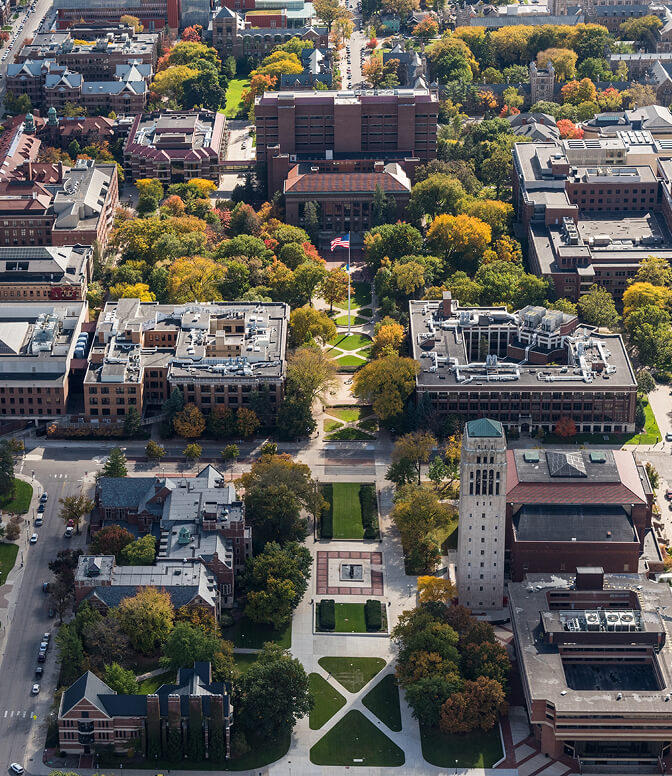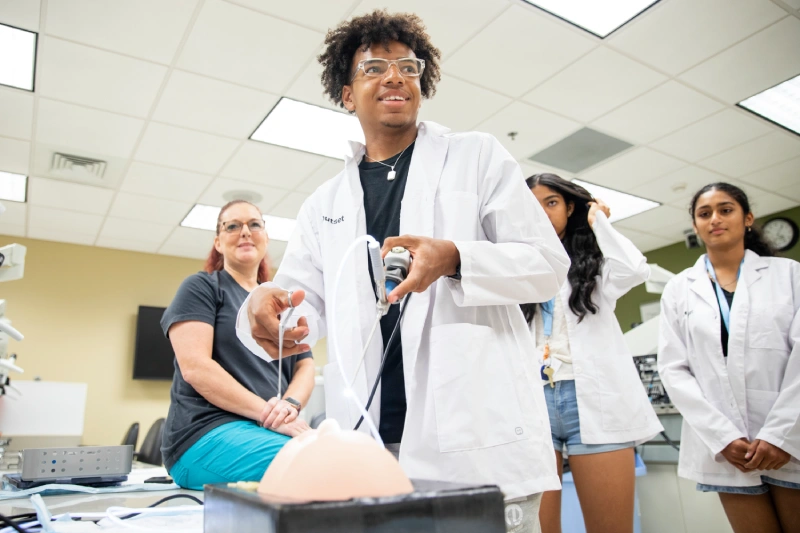Are you fascinated by the human body's mechanics and dream of helping people overcome musculoskeletal challenges? If so, learning how to become an orthopedic surgeon might be your calling.
The path to becoming an orthopedic surgeon demands serious dedication, spanning more than a decade. Understanding how to become an orthopedic surgeon involves knowing the educational requirements, necessary skills, and the rewards this fulfilling career offers.
If you're a teen curious about how to become an orthopedic surgeon, this guide is just for you.
What Does an Orthopedic Surgeon Do?
Orthopedic surgeons diagnose, treat, and prevent conditions affecting the musculoskeletal system, including bones, joints, muscles, tendons, and ligaments. Their work involves both surgical and non-surgical treatments to restore mobility and relieve pain.
They begin by evaluating patients through physical exams and diagnostic imaging like X-rays, MRIs, and ultrasounds. Treatment options range from physical therapy and medication to surgical procedures such as fracture repairs, joint replacements, and spinal surgeries.
In addition to performing operations, orthopedic surgeons manage chronic conditions like arthritis and osteoporosis, helping patients maintain long-term mobility. Post-surgical care includes follow-up exams, rehabilitation plans, and collaboration with physical therapists and other specialists to ensure proper recovery.
By combining advanced medical techniques with personalized treatment plans, orthopedic surgeons play a crucial role in improving patients’ quality of life, helping them regain movement and return to daily activities with reduced pain and better function.
Education and Training Requirements: How to Become an Orthopedic Surgeon
Becoming an orthopedic surgeon starts with a four-year bachelor’s degree in biology, chemistry, or pre-medical studies to build a strong science foundation. Afterward, you must pass the Medical College Admissions Test (MCAT) to enter medical school, where you'll spend four years earning an MD or DO degree. During medical school, you'll also begin the licensing process by taking the first two steps of the United States Medical Licensing Examination (USMLE).
Next, you'll complete a five-year orthopedic surgery residency, which includes one year of general surgery training and preparation for Step 3 of the USMLE.
Some surgeons choose to pursue an optional fellowship, lasting one to three years, to specialize in areas like sports medicine, spine surgery, or pediatric orthopedics. Finally, you'll obtain board certification through the American Board of Orthopedic Surgery, which requires ongoing education to maintain.
How Long Does It Take to Become an Orthopedic Surgeon?
The journey to becoming an orthopedic surgeon spans 13 to 15 years after high school. It includes:
- Bachelor’s Degree: 4 years focused on building a strong science foundation.
- Medical School: 4 years of coursework in basic sciences and clinical rotations in various medical specialties.
- Orthopedic Surgery Residency: 5 years of specialized training, including one year of general surgery.
- Fellowship (Optional): 1–2 years for those who want to specialize further.
This timeline ensures you develop the necessary skills to become a competent orthopedic surgeon, with the option to focus on a subspecialty for deeper expertise.
Skills and Qualities Needed to Become a Successful Orthopedic Surgeon
Success as an orthopedic surgeon requires a blend of technical expertise and interpersonal abilities—these essential skills for future doctors develop throughout your training and practice.
Manual dexterity tops the list of essential skills. Surgical precision is crucial when performing delicate procedures on bones, joints, and surrounding tissues. This skill develops during residency as you perform countless procedures under supervision before mastering them independently.
Problem-solving abilities are just as important. You'll need to diagnose complex musculoskeletal disorders and determine the best treatment approach—surgical or nonsurgical. Skill in interpreting medical imaging is crucial for accurate diagnoses and treatment planning.
Physical stamina matters too. You'll spend long hours in operating rooms and emergency departments, sometimes handling middle-of-the-night emergencies and complex cases.
Teamwork and communication skills round out the package. You'll collaborate with nurses, physical therapists, and other healthcare professionals while clearly explaining complex procedures to patients. Understanding rehabilitation principles helps you implement physical therapy interventions for post-injury or surgery recovery.
The Association of American Medical Colleges (AAMC) defines essential skills and attributes for medical students to succeed in their training and careers. Their premed competency framework serves as a guide, helping future physicians develop the knowledge, critical thinking, and interpersonal abilities needed to navigate medical school and provide high-quality patient care.
Average Orthopedic Surgeon Salary
Orthopedic surgeons rank among the highest-paid medical specialists. According to the U.S. Bureau of Labor Statistics, physicians and surgeons, including orthopedic surgeons, earn a median annual wage of $239,200 or more. However, data from Salary.com shows an even higher median salary of $553,490 for orthopedic surgeons, highlighting the significant earning potential within this specialty.
The job market shows promising stability and growth. The BLS projects a 4% increase in employment opportunities by 2033, driven by an aging population needing more musculoskeletal care and an increasing emphasis on sports medicine.
Orthopedic surgeons work in diverse settings: over 35% join private practice groups and approximately 17% are directly employed by hospitals. Others find positions in academia, health maintenance organizations (HMOs), government agencies, and military services. This variety contributes to the field's stability and attractive compensation.
Challenges and Rewards of Becoming an Orthopedic Surgeon
The path to becoming an orthopedic surgeon demands exceptional dedication and perseverance. Orthopedic surgery is challenging, often stressful, and demands true commitment.
You'll juggle clinical duties, operating room responsibilities, and emergency consultations—often managing middle-of-the-night emergencies, complex cases, postoperative complications, and occasional adverse outcomes.
There will be a lot of late nights, a lot of studying, a lot of learning. This intense workload affects not just you but your family too, due to the substantial time commitment throughout training and practice.
Yet orthopedic surgery offers remarkable rewards. Helping patients regain mobility and improve their quality of life brings immense satisfaction. The field offers excellent job prospects in academic institutions, hospitals, and private practices across urban and rural settings.
These advantages, combined with competitive compensation and the personal gratification of making tangible differences in patients' lives, make becoming an orthopedic surgeon a deeply rewarding career path.
Alternative or Related Careers in Orthopedics
Interested in musculoskeletal medicine but considering alternatives to becoming an orthopedic surgeon? Several related paths offer rewarding opportunities:
- Sports Medicine Physician: Treat athletes and active individuals, focusing on injury prevention, treatment, and recovery. These physicians often work with sports teams or in specialized clinics, benefiting from the increasing emphasis on sports medicine.
- Physical Therapist: Help patients recover from injuries and surgeries through targeted exercises and rehabilitation techniques. Physical therapists often collaborate with orthopedic surgeons in post-operative care.
- Podiatrist: Focus exclusively on foot and ankle disorders, including surgical and non-surgical interventions. This specialty requires less training time than orthopedic surgery while still allowing for surgical practice.
- Physician Assistant: Work alongside orthopedic surgeons to evaluate patients, assist in surgeries, and provide follow-up care. This career requires less training but still offers involvement in orthopedic cases.
- Orthopedic Nurse Practitioner: Provide specialized care for orthopedic patients, including assessment, treatment planning, and patient education in clinical and hospital settings.
- Rehabilitation Medicine Physician: Specialize in physical medicine and rehabilitation (PM&R) to help patients regain function after injuries or surgeries without performing surgeries yourself.
These alternatives typically require less training time than becoming an orthopedic surgeon while still allowing you to work within the musculoskeletal field and impact patient mobility and quality of life.
Steps for Teens: How to Become an Orthopedic Surgeon
Starting early gives you a significant advantage if you're interested in how to become an orthopedic surgeon. Here's how to begin your journey:
- Excel in science and math courses: Take advanced classes like AP Biology, AP Chemistry, AP Physics, and AP Calculus to build a strong foundation for pre-med studies.
- Develop strong study habits: Medical education requires extensive memorization of muscles, nerves, and bones, so practice effective study techniques now.
- Enhance your manual dexterity: Participate in activities improving hand-eye coordination and fine motor skills—essential for surgical procedures.
- Join sports teams: Playing sports develops teamwork and leadership skills, plus builds the physical stamina needed for long surgical procedures.
- Volunteer at hospitals or clinics: Gain exposure to healthcare environments, take advantage of networking opportunities, and build relationships with medical professionals.
- Shadow orthopedic surgeons: Observe surgeons at work to understand the profession beyond media portrayals.
- Attend medical summer programs: Look for specialized programs like Outset’s summer programs for high school students interested in medicine.
- Find a mentor early: Connect with someone who has traveled this path to provide guidance for students throughout your journey.
- Read about the profession: Books like "The Making of a Surgeon" by William Nolen offer realistic insights into surgical careers.
- Work on communication skills: Take language and communication courses and practice explaining complex concepts clearly, as patient communication is crucial.
Explore an Orthopedic Surgery Career with Outset
Curious about the world of orthopedic surgery? Outset offers hands-on experiences where you can explore how surgeons diagnose and treat bone, joint, and muscle conditions. Shadow experts, observe real procedures, and gain valuable insights into this dynamic specialty. Ready to get started? Click “Apply” on our website today!
Final Thoughts
Becoming an orthopedic surgeon is a long and demanding journey, but the rewards are immense. Not only will you help people regain mobility and improve their quality of life, but you'll also be part of a respected and high-paying medical field. The dedication and hard work required in training prepare you for a fulfilling career that combines technical expertise with the opportunity to make a real difference in patients' lives.
If you're a teen considering this path, start early by excelling in science and math, gaining exposure to the healthcare field, and developing the manual dexterity and stamina necessary for surgery. The journey may be tough, but with perseverance and passion for helping others, becoming an orthopedic surgeon can be an incredibly rewarding career choice.
Resources & References
American Board of Orthopedic Surgery
American Academy of Orthopedic Surgeons
Association of American Medical Colleges (AAMC)
Medical College Admissions Test (MCAT)














.png)








